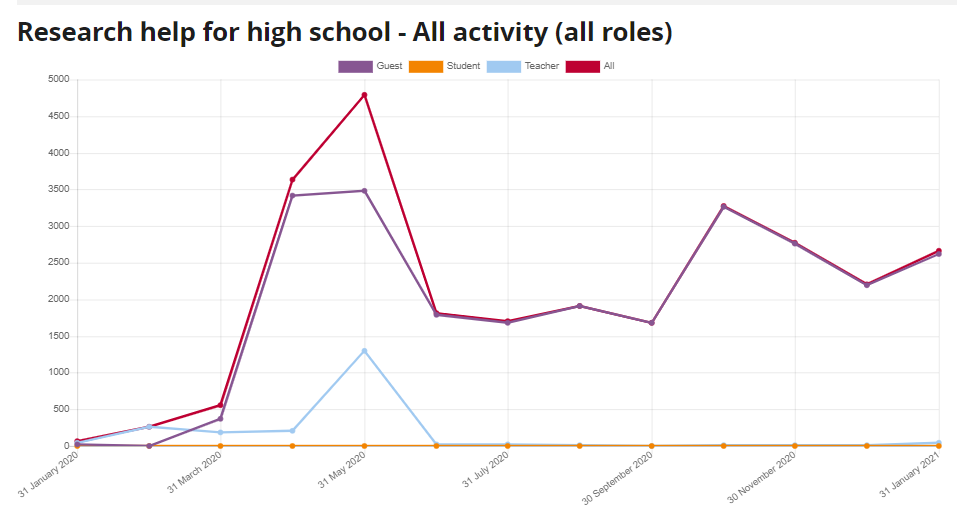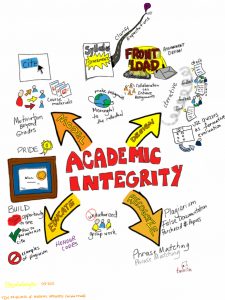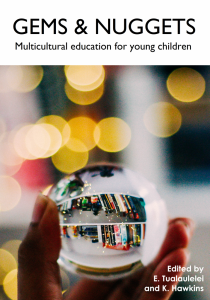Ways in which USQ Library has contributed to quality education

Access to inclusive and equitable quality education and lifelong learning opportunities underpins the success of all 17 Sustainable Development Goals. By actively contributing to the development and delivery of quality higher education through support for learning, teaching and research, academic libraries transform the lives of individuals, families, communities and the nation (CAUL, 2019).
USQ Library deploys learning physical and online environments that are student- centred, authentic, cooperative and engaging and supported by an extended range of high quality resources, facilities and technologies. We are committed to providing a supportive, connected and intuitive experience that enables:
- students to develop the confidence, resilience and skills required to reach their potential as engaged, informed and productive citizens, and
- staff to access the tools, supports and systems required to reach their potential as world-class teachers, researchers and professionals.
Outreach to local high school students
Kate Derrington, Learning Advisor | Lyndelle Gunton, Manager (Education Support) | Dr Eddie Thangavelu, Learning Advisor
High school students face increasing pressure to find quality information sources to include in their assessment. They also need to develop information literacy and study skills in preparation for entering tertiary study. On request for support from local high school staff, USQ Library developed the Research Help for High School online guide. This freely accessible list links students to open access resources in the Australian Senior Curriculum subject areas of biology, chemistry, mathematics, physics, psychology, modern history, ancient history and legal studies. It also offers self-paced tutorials for developing study skills including writing, editing, and proofreading, grammar checking, and notetaking along with support for improving information searching and how to evaluate information sources.
This outreach initiative aims to establish a connection between high school students and a higher education institution while students are still in school, encouraging aspirations to continue with post-secondary education. Due to COVID-19 restrictions in 2020, access to learning resources via classroom and school libraries was impacted for many students. Promotion of the High School Research and Study Skills site was increased in 2020 to support school students transition to online study and provide information to parents and carers. Since it’s introduction in January 2020, the resource has received more than 25,000 visits with a peak of 3486 in the month of May 2020. The High School Research and Study Skills site provides reliable access to quality information for students, who have difficulty accessing resources, thereby providing opportunities for students’ future development and upskilling.

Academic integrity tool
Lyndelle Gunton, Manager (Education Support)

USQ Library has long been actively involved in issues relating to academic integrity. The Library supports students to develop awareness of the value and principles of academic integrity and how to apply them during their studies with the purpose of forming graduates who connect the importance of integrity with professional pathways. While support for referencing of information sources remains a focus, USQ Library staff developed and piloted an online, self-paced learning activity for students to step through as an educative strategy for reducing incidents of academic misconduct. Over the space of three years, courses from across all disciplines of study at USQ trialled this as a mandatory learning activity. Evaluation data indicated a reduced number of incidents along with a reduction in the number of hours spent by course examiners and administrative staff in managing incidents. Student feedback suggested they are generally satisfied with their learning experience and believe that the tool is a useful way to learn about academic integrity in the USQ context. The success of the pilot led to the establishment of a working group, which proposed a whole-of-program strategy and an implementation plan as part of the University strategy for managing academic integrity. Library staff contributed to the working group and in 2020 the Academic Integrity Tool was adopted by USQ’s Academic Integrity Unit as a mandatory learning activity for all undergraduate students. In Semester 1, 2021, the Academic Integrity Tool was rolled out across courses for students to complete prior to submission of their first assessment item.
Assumed Knowledge
Akshay Sahay, Maths Learning Advisor | Debi Howarth, Manager (Student Learning and Devleopment)
The University of Southern Queensland (USQ) modified its admission’s policy in 2020 enabling opportunity for greater numbers of potential students to seek admission to degree programs. The Library’s Student Learning and Development Team (SLD Team) was commissioned to develop resources and approaches to diagnose and support students with academic literacy and numeracy assumed knowledge skills they maybe lacking.
The Assumed Knowledge (AK) initiative curated and created academic literacy and numeracy skill tests and resources to support student success. Resources and approaches were promoted widely within the University. Students could access diagnostic tests to self-assess skills prior to starting courses. Students were provided with access to an array of synchronous and asynchronous resources developed within the USQ StudyDesk online learning management system.
The AK initiative has been used by a total of 135 students with subsequent increase in usage shown every semester. As per the graph shown below, the 135 students have viewed and accessed the learning resources up to a maximum of 1100 times (minimum 100 times). The initiative helped students to identify assumed knowledge deficiencies and raise awareness about the support available. The Library teams involved in developing the resources and approaches through a dedicated Moodle StudyDesk site, with exclusive access to diagnostic tests through the Library’s StudyDesk pages, are now able to speak authoritatively around the need to support AK students in a variety of ways.
Student feedback has confirmed the success of this approach to assumed knowledge as demonstrated with the following testimonial:
Student feedback
“As a middle ages student returning to study, it has been difficult to understand the academic literacy and numeracy requirements for my success. The assumed knowledge diagnostic tests allowed me to gauge my level of academic literacy and numeracy skills and get the required assistance.”
Peer learning
Leigh Pickstone, Coordinator (Peer Learning)
The Meet-Up Peer Assisted Learning program provides support for students by students. Experienced, successful USQ students assist others to strengthen their understanding of discipline content, improve their academic skills, and become familiar with the university environment.
The goal for Meet-Up in response to COVID-19 in 2020 was to continue connecting with and supporting students entirely online, maintaining rates of student engagement through the move to an exclusively online study and learning environment. While some Meet-Up leaders had operated online previously, there were many for whom this move from on campus to online brought significant change. Along with moving online to provide peer support to other students, Meet-Up leaders also faced changes to their own mode of study, personal circumstances, and interacting with students stressed by the challenges the pandemic raised.

Meet-Up leaders have a mentor/mentee relationship with Course Examiners; this relationship helped facilitate any functional changes necessary on course StudyDesks. The Meet-Up leader group also has connecting structures and processes for the purpose of sharing ideas, problem solving, and building community. Peer support structures within the group using social media, planned communications between individuals and small groups, and communications with the Peer Learning Coordinator, enabled leaders to assist each other.
All Meet-Up activity operated online from the end of March 2020 to the end of semester 1. This included several USQ student community initiatives as well as peer support through course StudyDesk sites. Over this period, approximately half the student community initiatives experienced much reduced rates of student interaction, while course-based Meet-Up and some community Meet-Up continued to interact with students at a similar rate to the pre COVID experience. Meet-Up continued to operate largely online throughout semesters 2 and 3, continuing to engage with students at rates similar to pre COVID operation.
Meet-Up support through course StudyDesk sites utilises dedicated peer facilitated forums. Rates of interaction on these forums increased markedly between the end of May and the end of Semester 1. During this period, the number of students engaging with Meet-Up forums increased from 2255 to 3241 (a 43% increase), while the total number of forum interactions rose from 30537 to 79228, demonstrating a 159% increase in forum interactions. In semester 2 the number of students engaging with Meet-Up forums on course StudyDesk sites was 2559, and total interactions were 33117. During semester 2, interaction rates on Meet-Up forums returned to pre COVID rates, perhaps indicating that students had become more comfortable with the changes to their mode of study and environmental challenges.
Smarthinking
Dr Eddie Thangavelu, Learning Advisor | Kate Derrington, Learning Advisor
USQ provides online, on demand, 24/7, academic tutoring support via Smarthinking. This is significant for all students but especially with the approximately 75% of the USQ student cohort studying online. Equitable and accessible opportunities early in the student’s study have the potential to improve literacy and numeracy skills. Increased funding enabled the service to be offered across the university thus engendering greater equity of opportunity. Smarthinking was either embedded directly into courses targeting commencing students or made available through the USQ Library Study Support page. Undertaking a multi-pronged approach to Smarthinking accessibility doubled the usage as students were accessing the tutoring service via different points. In 2020 submissions to Smarthinking via the embedded course links were 1259 and submissions through the Library Study Support page were 1275. In conjunction with other tangible support through Learning Advisors, Smarthinking promotes self-directed learning and improves the learning experience despite potential disruptions during COVID-19.
Online Study Support
Dr Eddie Thangavelu, Learning Advisor | Kate Derrington, Learning Advisor
USQ’s Online Study Support (OSS) provides intentional online learning opportunities, across the year, incorporating teacher presence and facilitating social engagement. OSS demonstrates best practice guidelines for online learning by offering a variety of academic, maths, and study topics each week. The learning environment promotes belonging and connectedness between students and staff. In response to COVID-19, OSS was expanded in 2020, providing additional opportunities for students to connect with Library Services and other students. The provision of this service has seen a high uptake in Semesters 2 2020, and Semester 3, 2020/21 with a total of 171 students across 30 classes. In addition, as a result of COVID-19, there were changes to exams as a form of assessment, and students requiring support in this area was evident with 83 students attending two sessions about exam strategies.
Further evidence of the success of OSS can be seen in the positive feedback from students. Therefore, the OSS program gained traction and continues to grow as an avenue of support for students by enhancing the learning experience.
Student feedback
“Oh it is so nice to talk to a real person about all this. The recorded stuff is fine but this is so much better.”
“I feel overwhelmed in between but each week when I come back I feel reassured.”
Students as active creators of ‘Gems & Nuggets’: open knowledge for the community
Adrian Stagg, Manager (Open Education Practice) | Nikki Andersen, Open Education Content Librarian
USQ Library supports open education and actively engages students through the use of open assessment.

Early childhood students in the School of Education completed assessment that directly benefited professionals working in the field who were unable to access quality ongoing learning opportunities due to time, financial, and contextual resource constraints. The implementation of open assessment in the course was a transformation toward authentic, contextualised assessment that positioned sixty-seven students as future professionals and co-creators of knowledge.
The Course Examiner, Dr Eseta Tualaulelei, worked with a network of early childhood educators, and was supported by the open education, and grants and awards teams. Library staff supported Dr Eseta Tualaulelei by:
- Producing learning resources for students on finding open educational resources in order to support the compliance of their assessment
- Undertaking copyright checks of each student’s assessment
- Supporting the academic in the use of USQ’s open textbook platform, Pressbooks
Together, they supported the publication of student work, and openly and freely disseminated the quality assured student-created content that directly met the needs of practising professionals in the form of an openly-licensed textbook called ‘Gems and Nuggets.’
Aside from the publication of USQ’s first student-authored text, analysis of the student data showed an increase in engagement with the assessment task, student achievement levels, and understanding core concepts in multicultural and reconciliation-based education. Feedback from the community professionals has been uniformly positive, and the focus on the quality of student work, and its’ ability to meet immediate learning needs has been praised. The assessment has been facilitated a second time in S2, 2020, with subsequent student works to be published.
- Student engagement with the assessment resources in the first week of semester showed a positive increase from 47.1% to 57.5% (2019), and then 63.1% (2020), and pass rates (those students achieving 50% of total marks or more) of 97% (2019), and 83% (2020; the drop in figures ascribed to those assignments that failed only due to the marks penalty associated with late submission). Students invested in the co-creation process with a shift in forum discussion away from administrative queries to group discussion about core discipline concepts and student-student engagement.
Providing open access resources to support historical research in schools
Margaret Bremner, Senior Research Librarian
Two academics from the School of Education approached the Library Research Support Team to create open educational resources, in particular videos that could be used with student teachers to support the extension of history teaching in schools. The resources were intended to show students how to use existing institutional collections to answer historical questions.
A Liaison Librarian was invited as a collaborative partner for the resource development. Initially the full team of academics and librarians met to scope the project. Storyboard training was organised to help expand the topics and support future decision making. Although COVID 19 impacted on the choice of tools, Panopto was chosen for creating the videos.
Four videos with accompanying PDFs have been delivered to the academics. These resources have provided student teachers with relevant and easy to follow documentation for using institutional collections in promoting historical research.
Feedback from academics in response to providing open access resources to support historical research in schools
“Thank you both so much for all of your hard work and efforts in creating these wonderful resources for us. They are absolutely spot on and will certainly complement the work we are undertaking in the various courses.
The videos are wonderful – very clear and the inclusion of the video is so helpful for someone wishes to search through the various repositories. The written resources are also wonderful – so detailed and logical with very clear steps for someone to follow through – and of course they are a wonderful companion to the videos.”
Library Makerspace
Steph Piper, Coordinator (Community Engagement)
The USQ Makerspace is a community space for hands-on making with new digital fabrication technologies and traditional crafts. It focuses on experiential and problem-based teaching and learning strategies that are embedded in courses as part of curriculum or complement curricular learning activities. In addition, the Makerspace is often used for extra-curricular projects, bringing new, hands-on tech skills to students who do not have the opportunity to learn through coursework. Students can begin to develop a portfolio of projects that have been crafted through personal interest and passions with 3D printing, electronics and crafting. The Makerspace is part of the library, making the space accessible and easy to use regardless of discipline or study area. During 2020, the Makerspace transitioned from an in-person service to online workshops featuring mail-out kit workshops, allowing for a hands-on experience via distance. When the physical space reopened, online content and synchronous webinars and workshops have continued with participants from across the USQ community and beyond.
Library collections management
Lyndelle Gunton, Manager (Education Support)
USQ Library is committed to developing and maintaining collections that support current learning, teaching and research priorities at USQ. As part of this priority, we regularly assess our physical and digital collections to ensure their currency and relevancy. In 2020, Library staff undertook an evidence-based approach to deeply understand the way students and staff use our collections. We focussed on evaluating print collection items that have not been used for more than 10 years with more than 20,000 resources removed that were surplus to need while increasing our eBook collection by nearly 1000 titles. This has resulted in a reduction in the footprint of our physical collections to make way for new and innovative ways to use our on-campus library spaces to support learning and teaching.

